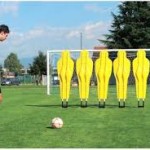 Abdominal hernias are a bulge or swelling in the abdominal wall which is a weak area. Normally your abdominal wall is a tough sheath of muscle and tendon that runs from your lower ribs to your pelvic bones. It acts to protect your internal organs, create stability for your spine, improve your balance and helps to keep your spine straight and posture tall.
Abdominal hernias are a bulge or swelling in the abdominal wall which is a weak area. Normally your abdominal wall is a tough sheath of muscle and tendon that runs from your lower ribs to your pelvic bones. It acts to protect your internal organs, create stability for your spine, improve your balance and helps to keep your spine straight and posture tall.
Sometimes a weakness in the wall will allow some of the intestines to pass through. There are a couple different types of abdominal hernias that involve different parts of the abdominal wall. In an umbilical hernia the weakness occurs near the belly button. These are more common in young children but may disappear as they reach adulthood without surgical intervention. However, if adults develop an umbilical hernia they will need surgical repair to prevent herniation of the intestines.
Incisional hernias will happen around an old surgical scar. They can happen months after the surgery. And an inguinal hernia is a bulge that appears in the groin area. In a man that bulge can occur in the scrotal sac.
A hiatal hernia will occur in the upper part of the stomach, inside the body. In this instance part of the intestines will push into the chest.
Typically an abdominal hernia will not cause you to see your doctor. Rather you or your physician will notice the physical bulge first and investigate the cause. However, while most will not seek the care of their doctor for pain, they will indicate there had been discomfort with physical activity that they overlooked.
On the other hand, hernias that have incarcerated or strangulated will be very painful and require immediate care. In these cases the intestines or other tissue will protrude through the weakened area and lose blood supply. This causes the tissue to die. This is very painful and can be a surgical emergency.
Abdominal hernias will be a problem for weightlifters who have a pre-existing problem with a weakened area in the abdominal wall. The increase in the intra-abdominal pressure while lifting will put added pressure on the abdominal musculature. However, weight lifting and bodybuilding will not cause a hernia if you were not already predisposed to having one.
Resources:
BUPA: Abdominal Hernia
http://www.bupa.co.uk/individuals/health-information/directory/a/abdominal-hernia
MedlinePlus: Hernia
http://www.nlm.nih.gov/medlineplus/ency/article/000960.htm
Journal of the Society of Laparoendoscopic Surgeons: Hernias as a source of abdominal pain
http://www.ncbi.nlm.nih.gov/pmc/articles/PMC3015620/
MedlinePlus: Lump in the abdomen
http://www.nlm.nih.gov/medlineplus/ency/article/003277.htm
Yale School of Medicine: Abdominal Wall Hernias
http://medicine.yale.edu/surgery/gastrointestinal/bariatric/patient_care/conditions/abdominal.aspx#page1
Merck Manual Home Health Handbook: Abdominal Wall Hernias
http://www.merckmanuals.com/home/digestive_disorders/gastrointestinal_emergencies/abdominal_wall_hernias.html


Leave a Reply